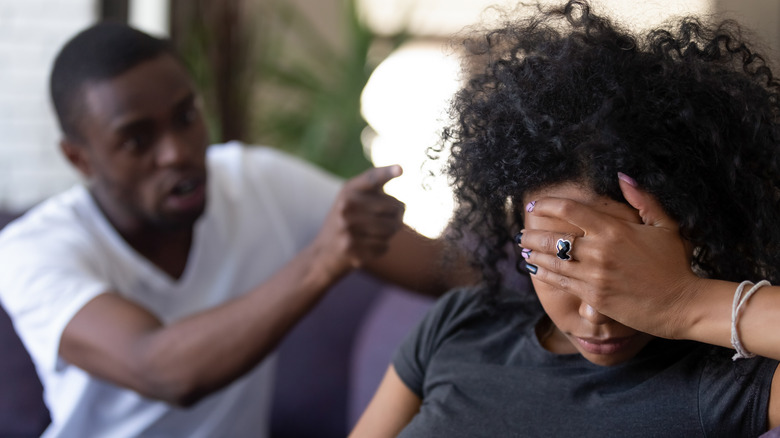We're Giving You Permission To Get Back With Your Ex — But Only Sometimes
The statistics about on-again couples — those who break up then get back together — are more sobering than we expected; they tend to be lower quality than relationships that have never broken up. Social psychologist Theresa DiDonato, Ph.D., shared with Psychology Today that they can be less fulfilling in terms of needs, sexual and otherwise, and less loving and satisfying, especially if one of you was unfaithful. If this is something you're grappling with right now, learning how to tell your partner you were unfaithful is crucial for everyone's mental health — and future relationships.
But don't lose heart. You can re-examine interpersonal nuances to make sure you return to your old flame in a healthy way. After all, you broke up for a reason.
First, determine if the breakup was caused by internal or external factors. External forces that initially worked against you but that have since been resolved are a great indicator that, if the love is real, you can try again and make it work. For example, if you had a long-distance relationship but now both of you can live in the same city, that's promising. Or, if one of you was consumed by a demanding job and finally switched careers for a healthier work/life balance, this opens up tons of possibilities. If parental disapproval was getting in the way because of a different religion, you may decide your partner is your main priority then find compassionate ways to help your parents get to know your person.
Signs it's not a great idea to get back together
As we mature, we gain more insight into our parents' worldview. Parental disapproval can arise from a limited perspective, like instantly rejecting your partner's culture. But if your parents were open and loving yet were afraid for you (or if your friends also openly disliked your partner), have a conversation to see what they saw.
If you want to get back together because you're afraid to be alone, that's a red flag. If your relationship was filled with red-hot sexual chemistry but you were never truly friends, lit hormones can't sufficiently predict a successful reunion. If you found yourselves in a pattern of breaking up and reuniting multiple times, there may be a fundamental incompatibility, especially if there was any abuse. The National Domestic Violence Hotline reports that "In fact, survivors of abuse return to their abusive partners an average of seven times before they leave for good." Please don't let that be you. When you were together, if you had a gut feeling your partner was hiding something, you were probably right. Further, a profound breach of trust might be a dealbreaker, but when one or both of you take zero responsibility for the betrayal, cheating is likely to reoccur.
If you or someone you know is dealing with domestic abuse, you can call the National Domestic Violence Hotline at 1−800−799−7233. You can also find more information, resources, and support on their website.
Signs it could work out well
When both of you can pace your reconnection slowly and openly discuss the reasons for the breakup, that's positive. For example, if one of you was dealing with addiction or past trauma and got counseling, went to rehab, and you've each taken your respective healing journeys seriously, that's an excellent sign.
If you fought previously, it doesn't automatically mean you're doomed. Even healthy, happily married couples fight. We each have such wildly unique life experiences and grow up with different gender programming, parents, and cultural influences. How could we not view the same event from opposing angles on occasion? A fight isn't the problem. The secret ingredient is to fight fairly and maintain a baseline of mutual respect and love. Also, don't fall into the trap of saying yes to potential. Your partner's loving traits need to be visible, not lurking as a hazy future potential. Love and acceptance — of yourself and your partner — are critical.
Counselor Caitlin Killoren shared with relationship platform Relish that there are methods to encourage a successful reunion. One is to agree to frame it as an experiment. Take the partnership out for a spin to make sure the ride is smooth. Another is to actively release past grievances — do some forgiveness work with a counselor as needed. And if you're not sure where to begin in therapy, we have some tips to kickstart the conversation.


